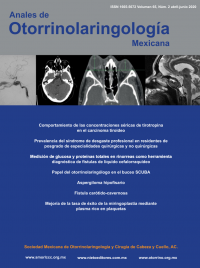Smoking as a risk factor of peritonsillar abscess.

An Orl Mex. 2019 abril-junio;64(2):44-48.
Gabriel Mauricio Morales-Cadena,1 Rodrigo Alejandro Jacinto-Gómez,2 Nydia Dessirée Jaurrieta-Hinojos,2Mariana Gabriela Fonseca-Chávez3
1 Profesor titular del curso de posgrado de Otorrinolaringología y cirugía de cabeza y cuello.
2 Alumno del curso de posgrado de Otorrinolaringología y cirugía de cabeza y cuello.
3 Profesor invitado del curso de posgrado de Otorrinolaringología y cirugía de cabeza y cuello.
Facultad Mexicana de Medicina de la Universidad La Salle, Hospital Español de México, Ciudad de México.
Resumen
ANTECEDENTES: El tabaquismo tiene una influencia inflamatoria e inmunológica local y sistémica, altera la flora bacteriana normal y produce inflamación crónica de los tejidos adyacentes de la cavidad oral y la orofaringe.
OBJETIVO: Analizar si existe relación en el origen de los abscesos periamigdalinos y el antecedente de tabaquismo.
MATERIAL Y MÉTODO: Estudio retrospectivo, transversal, observacional y longitudinal, en el que se revisaron los expedientes de pacientes ingresados al Hospital Español de México con el diagnóstico de absceso periamigdalino en el periodo comprendido entre enero de 2012 y agosto de 2018. Se formaron dos grupos de pacientes para su estudio: el grupo con tabaquismo y el grupo sin tabaquismo, identificando aspectos clínicos.
RESULTADOS: Respecto a los síntomas y signos no se obtuvo relación estadísticamente significativa con el antecedente de tabaquismo; de forma similar, no se encontró relación entre el antecedente de tabaquismo y las variables: administración de antibiótico previo al ingreso hospitalario, mes de ingreso, días de estancia hospitalaria y días de evolución.
CONCLUSIÓN: En este trabajo no se logró conciliar una franca relación del tabaquismo con la aparición de abscesos periamigdalinos, por lo que las hipótesis que señalan a esta condición como consecuencia de infecciones respiratorias recurrentes y la oclusión de las glándulas salivales menores de Weber en adultos jóvenes siguen prevaleciendo.
PALABRAS CLAVE: Absceso periamigdalino; tabaquismo; glándulas salivales.
Abstract
BACKGROUND: Smoking has a local and systemic inflammatory and immunological influence, alters the normal bacterial flora and produces a chronic inflammation of the tissues adjacent to the oral cavity and the oropharynx.
OBJECTIVE: To analyze if there is a relationship between the origin of the periamigdalin abscesses and the history of smoking.
MATERIAL AND METHOD: A retrospective, observational and longitudinal study in which the files of patients admitted to the Hospital Español de México with the diagnosis of peritonsillar abscess in the period between January 2012 to August 2018 were reviewed. Groups of patients for study: the group with smoking and the group without smoking.
RESULTS: Respect for symptoms and signs, a statistically significant relationship with the history of smoking was not obtained; similarly, no relationship of smoking history was found with the following variables: antibiotic use before hospital admission, month of admission, days of hospital stay and days of evolution.
CONCLUSION: In the present work we cannot reconcile a clear relation between smoking and the development of peritonsillar abscesses; the hypothesis that indicate this condition is secondary to recurrent respiratory tract infections and the occlusion of the minor salivary glands of Weber in adult adults continues to prevail.
KEYWORDS: Peritonsillar abscess; Smoking; Salivary glands.

